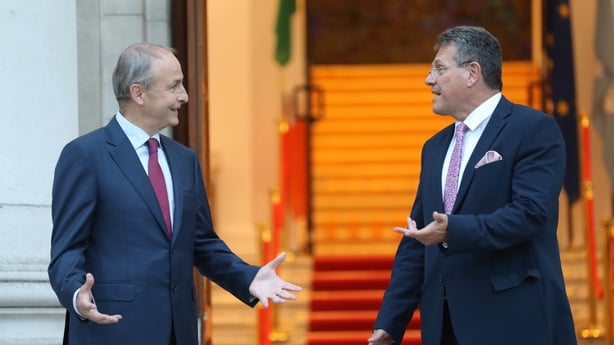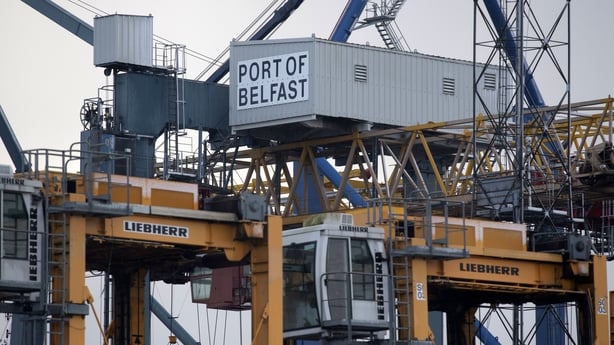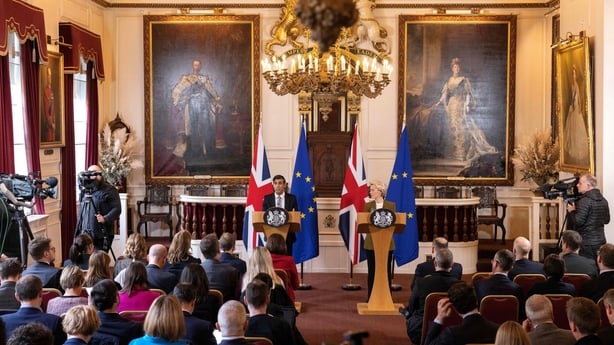Just over a week ago, Tánaiste and Minister for Foreign Affairs Micheál Martin met the EU chief negotiator Maroš Šefčovič in Brussels. This was Sunday night, ahead of the Foreign Affairs Council meeting the next day.
The EU's point man on Brexit negotiations was very tense and down. In a break with the usual flow of meetings in the Commission’s Berlaymont building, he wanted to open the bottle of whiskey that was in the room.
Such a departure from typical procedures was ascribed to the heightened expectation from January this year, that finally, the two sides were on the cusp of a deal to resolve the seemingly intractable issues with the Northern Ireland Protocol.
The tension on that night was the result of a build-up towards the breakthrough, which took several weeks with many false dawns when a deal seemed to be within reach only to fail again.
Diplomats say this happened even though wheels were in motion to unveil an agreement.

That happened again last weekend when Saturday was supposed to be the breakthrough day, but the visit of EU Commission President Ursula von der Leyen was cancelled the day before.
Since the implementation of the protocol in January 2021, the agreement has been beset with practical difficulties, which were catnip to a hostile British press.
Sausage wars and a ban on the import of seed potatoes may have seemed trivial, but the issues were deadly serious.
Businesses were drowning in paperwork, supermarket shelves were bare and there were difficulties accessing new medicines.
The upheaval was also spilling onto the streets of Northern Ireland as the protocol became a lightning rod for discontent.
Stormont was also mothballed as the DUP pulled out and an assembly election failed to break the deadlock.
Diplomats in Brussels believe that the breakthrough came with the data-sharing agreement in January.
This provided the real-time information to enable the monitoring of goods into Northern Ireland and would facilitate the establishment of the green lanes/red lanes and trusted trader arrangements.

This safeguard along with the timetable for the construction of border posts paved the way for a broader deal.
But the overarching change undoubtedly was the arrival of new British Prime Minister Rishi Sunak.
From then the mood music changed following years of negotiating with different characters.
Trust had been shattered by the British government’s tabling of the Northern Ireland Protocol Bill, which sought to unilaterally override the agreement.
However, a new pragmatic prime minister revitalised the negotiations and according to one insider, the EU could then make a leap of faith that it could not a year ago.
That is the explanation for why it took so long to reach this deal despite the EU’s insistence that the protocol has not been renegotiated and any flexibilities or changes have been done within the framework of the original agreement.
But while the EU insists this is a tweaking of the original agreement, the UK side is proclaiming that the protocol has been rewritten. And it has now been renamed (in Britain) as the Windsor Framework.
It seems the EU is happy to allow the UK to put its own gloss on the agreement. In EU circles, it’s understood that EU has the choice of still calling the agreement the Northern Ireland Protocol.

A creative solution is how it’s being viewed. Others might call it a fudge, but it’s clear there is a willingness on the EU’s part to allow the UK some leeway in how it sells the deal.
This will strengthen the British Prime Minister’s hand in attempting to win over the Eurosceptics in his own party as well as the DUP.
It’s still not clear whether the DUP will back the deal paving the way for the return of the Stormont Assembly and the restoration of power-sharing.
If that were to happen, would Brexit be done? One view is that it will never done, there will always have to be tweaks and changes.
Just look at veterinary medicine where existing flexibilities will be extended until 2025 to allow more time to reach a solution.
But many feel that this week’s deal has a very good chance of getting over the line and leading to that much desired normalisation of relations between the EU and the UK.







